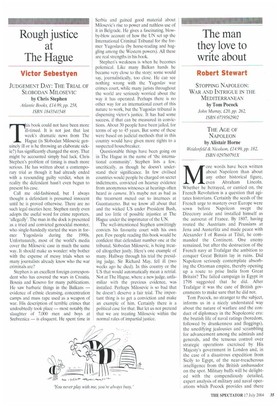Rough justice at The Hague
Victor Sebestyen
JUDGEMENT DAY: THE TRIAL OF SLOBODAN MILOSEVIC by Chris Stephen Atlantic Books, £14.99, pp. 258, ISBN 1843541548 Tlis book could not have been more ill-timed. It is not just that last week's dramatic news from The Hague (is Slobodan Milosevic genuinely ill or is he throwing an elaborate sickle?) has significantly changed the stoty. That might be accounted simply bad luck. Chris Stephen's problem of timing is much more serious. He has written about a contemporary trial as though it had already ended with a resounding guilty verdict, when in reality the defendant hasn't even begun to present his case.
Call me old-fashioned, but I always thought a defendant is presumed innocent until he is proved otherwise. There are no such legal niceties here. Stephen rarely even adopts the useful word for crime reporters, 'allegedly'. The man in the dock is presented as a tried and convicted genocidal monster, who single-handedly started the wars in former Yugoslavia during the 1990s. Unfortunately, most of the world's media cover the Milosevic case in much the same way. It should make us wonder: why bother with the expense of messy trials when so many journalists already know who the war criminals are?
Stephen is an excellent foreign correspondent who has covered the wars in Croatia, Bosnia and Kosovo for many publications. He saw barbaric things in the Balkans — evidence of ethnic cleansing, concentration camps and mass rape used as a weapon of war. His description of terrible crimes that undoubtedly took place — most notably the slaughter of 7,000 men and boys at Srebrenica — is eloquent. He spent time in Serbia and gained good material about Milosevic's rise to power and ruthless use of it in Belgrade. He gives a fascinating, blowby-blow account of how the UN set up the International Criminal Tribunal for the former Yugoslavia (by horse-trading and haggling among the Western powers). All these are real strengths in his book.
Stephen's weakness is when he becomes polemical. Like many Balkan hands he became very close to the story; some would say, journalistically, too close. He can see nothing wrong with the Yugoslav war crimes court, while many jurists throughout the world are seriously worried about the way it has operated. Perhaps there is no other way for an international court of this nature to work, but the Yugoslav tribunal is dispensing victor's justice. It has had some success, if that can be measured in convic tions. About 30 people have been jailed, for terms of up to 45 years. But some of these were based on judicial methods that in this country would have given more rights to a suspected housebreaker.
Questionable things have been going on in The Hague in the name of 'the interna tional community'. Stephen lists a few, uncritically, as though be doesn't understand their significance. In few civilised countries would people be charged on secret indictments, convicted on hearsay evidence from anonymous witnesses at hearings often
heard in camera. It's maybe not as bad as
the treatment meted out to internees at Guantanamo. But we know all about that and the wicked US under President Bush, and too little of possible injustice at The Hague under the imprimatur of the UN.
The well-intentioned Stephen unwittingly convicts his favourite court with his own pen. Few people reading this book would be confident that defendant number one at the tribunal, Slobodan Milosevic, is being treat ed altogether justly. Here's one example of many. Halfway through his trial the presiding judge, Sir Richard May, fell ill (two weeks ago he died). In this country or the US that would automatically mean a retrial. Not at The Hague, where a new judge, unfa miliar with the previous evidence, was installed. Perhaps Milosevic is so bad that he doesn't deserve a fair trial. The impor tant thing is to get a conviction and make an example of him. Certainly there is a political case for that. But let us not pretend that we are treating Milosevic within the normal rules of impartial justice.


























































 Previous page
Previous page